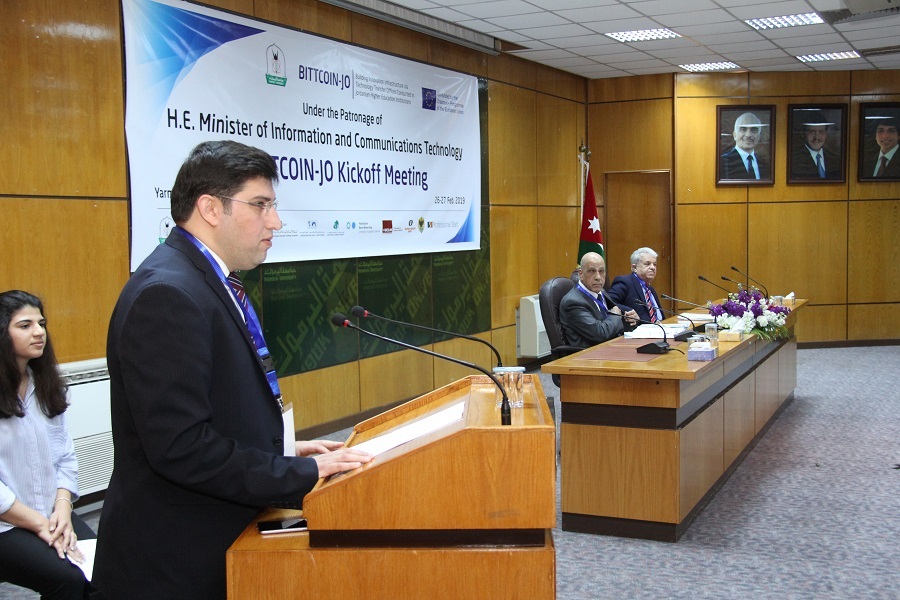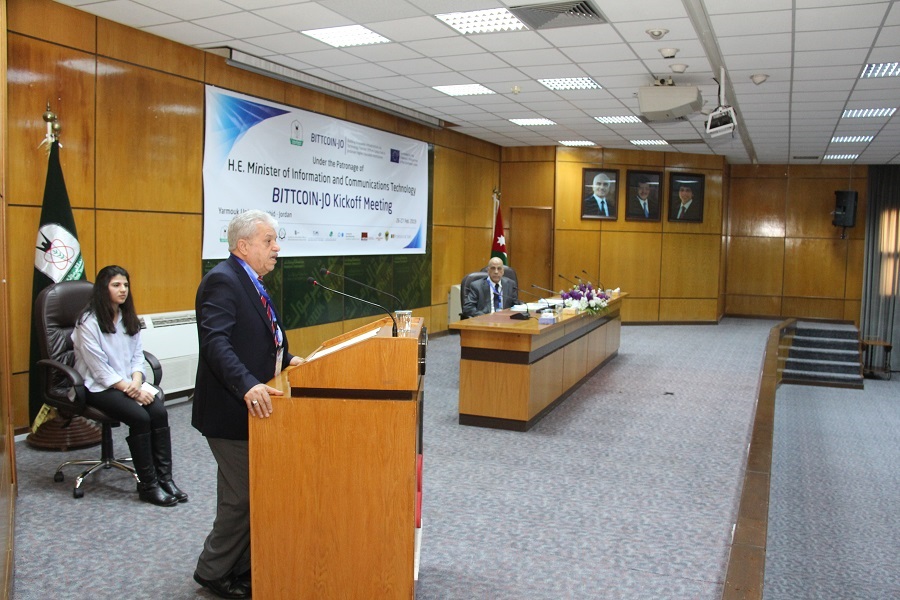Deputizing for the Minister of Communications and Information Technology, the president of YU Prof. Zeidan Kafafi sponsored the opening ceremony of the BITTCOIN-JO program, which comes under the Erasmus+ program supported by the European Union. The program aims at establishing technology transfer centers in higher education institutions in Jordan, and is implemented by YU in collaboration with twelve academic and industrial partners from Jordan and Europe.
In his speech at the opening ceremony, Kafafi said that YU strongly believes in the importance of creating effective relationships between academic and industrial sectors. He stressed the importance of benefiting from European universities’ experiences in the field of technology transfer and applying them in the Jordanian higher education system. Kafai then praised the efforts of the project members for their hard work and dedication to ensure the program's success.
The president also stressed the keenness of YU to graduate qualified, distinguished, and creative youth energies to be active individuals who can make positive changes in their society. He further pointed out that Yarmouk offers training courses and programs to its employees, students and to the members of the local community in various areas, in collaboration with business and industrial institutions as well as non-governmental organizations and other local or international institutions, pointing out that YU have established several incubators for various companies to provide training opportunities for students and to prepare them to enter the job market efficiently and competently.
For his part, Dr. Ahmad Abu-El-Haija, the director of the Erasmus+ office in Jordan, said that the EU-funded Erasmus+ program is a European collaborative program that supports project partnerships, exchange, policy dialogue in education and training, youth and sports, and offers opportunities for higher education institutions, employees and students from all over the world.
Abu-El-Haija further added that the European Union funded 91 collaborative projects in which Jordan participated in the past 15 years: 54 projects within Tempus program and 37 projects within the Erasmus program. Jordan received 16 grants with a share of 38 million euros for implementing the projects. He further noted that, between "2015-2018", the international exchange program under the Erasmus+ project provided exchange opportunities for more than 3,000 students and employees who traveled between EU and Jordan for training or educational purposes.
Abu-El-Haija added that YU is a leading institution in Tempus projects since its beginning in Jordan in 2002 with a total of 12 projects, noting that the first Tempus project coordinated by Jordan was applied by YU.
He further stated that Erasmus and Tempus programs helped Jordanian higher education institutions to cooperate with 29 of the 34 countries participating in the program, 9 Arab countries, in addition to Iran and Russia. Such connections helped Jordanian public and private institutions to collaborate with each other, linking academic institutes with nearly 30 ministries, non-governmental organizations and institutions, and enabling thousands of employees and students to travel between Jordan and Europe, which provided a suitable environment for cultural exchange and mutual understanding between the peoples of Jordan and Europe. The program also contributed to the development of Jordanian professors' competences in different areas, and helped Jordanian institutes to develop curricula for BA and MA levels.
The project manager, Dr. Mwaffaq Otoom, said that the meeting aims at creating a roadmap for the activities of the BITTCOIN-JO project, which is expected to offer new opportunities for Jordanian researchers, businessmen and industry, adding that the program supports innovations and emerging companies, based on the growing need to invest talented youth in Jordan
Otoom also noted that researchers and academics develop their research outputs into new products and services, pointing out that patents, publishing and marketing of these products, as well as cooperating with the industrial sector have become an urgent need for higher education institutions in Jordan, pointing out the BITTCOIN-JO project is an important step toward achieving these goals.
Otoom further said that the project will contribute to building a new model for technology transfer activities in Jordan through a series of training and capacity-building activities that will be implemented by the Project's Working Group, who will identify the challenges that technology transfer activities and models face to reach the process of research marketing.
Otoom also pointed out that the main product of the BITTCOIN-JO project will be the establishment of sustainable technology transfer offices at Jordanian universities, which are expected to work with the faculty members and students to market their projects, and patents to establish emerging companies
Otoom then reviewed the opening ceremony's events, which included a lecture on technology transfer by Frank Ohland, the CEO of the professional start company in Germany, a discussion on EU-funded projects results and the challenges they face when carrying them out as INVENT and TEJ projects, a discussion on establishing an effective technology transfer model in Jordan, and a lecture on financial management of Erasmus+ projects by Dr. Ahmad Abu-El-Haija, the director of the Erasmus+ office in Jordan.
The second day will include a meeting for the project partners to discuss financial and technical frameworks and the best implementation practices and will agree on the workplan, results and indicators. The event was attended by Vice president Dr. Fawwaz Al-Abed Al-Haq, Dr. Ahmad Al-Ajlouni, and a number of deans, faculty members and university officials.






